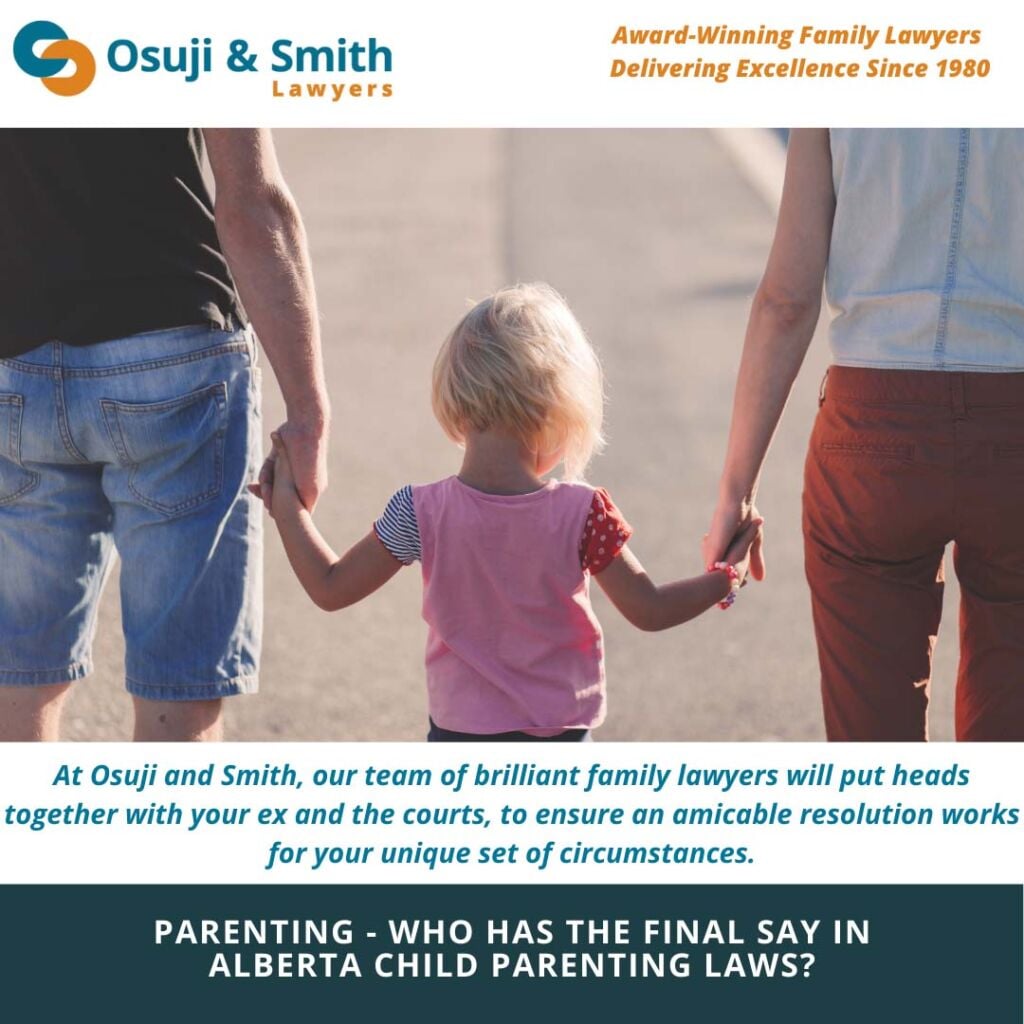Parenting – Who has the Final Say in Alberta Child Parenting Laws?
It’s a no-brainer that lawful parenting of the child depends on the child’s best interests, just as physical parenting does. Medical, educational, and religious decisions, as well as extra-curricular activities, are to be made by both parents in accordance with Albertan laws. The children’s wellbeing is expected to be prioritized following a breakup or divorce, even if the parents don’t have the best communication.
Whether the parenting schedule is agreed upon by the parties or ordered by the court, the courts aim to make sure that each parent has an equal voice in their children’s upbringing. Thus, Albertan courts favor joint legal parenting, where the parties exchange information regarding major issues that arise and try to reach a decision jointly. The courts, however, do not wish their parents to keep going back to court just because they disagree. For this reason, many joint legal parenting agreements and orders include provisions to break ties.
How is the Joint Legal Parenting Agreement Drafted?

The Courts want parents to learn of changes and updates and have their voices heard on the issue, despite the fact that it may feel difficult or even impossible to properly communicate with a co-parent. So, communication between co-parents is facilitated by co-parenting apps, such as Our Family Wizard and Co-parently. In spite of being informed and consulted, it’s likely that the parents will still disagree. At this point, one of the following tiebreakers would kick in.
- Final Decision-Making: Child parenting orders and agreements may assign the final decision to one party after careful consideration. Normally, the “final say” is given to the custodial parent.
- Spheres of Influence: Different parenting agreements may confer different final decision-making responsibilities on different areas of child parenting. For example, one parent may make the final decision about education, while the other decides about health care.
- Parent Coordination: The court or parenting agreement may also provide for the parents to meet with a parent coordinator if they disagree, so that the dispute can be resolved.
When is it proper to have sole parenting?
It is generally only appropriate to award sole parenting when communication between the parties is impossible. If there is a history of domestic violence and there is currently an order of protection in place, the courts will understand that it is not healthy or productive to ask the parents to communicate. A “carve out” is present in some orders of protection, which allows contact between the parties on behalf of the children.
Occasionally, Alberta Courts will find that one parent is more or less qualified to make decisions regarding specific aspects of the children’s lives. If one parent is an educator or a physician, they may be considered the best person to make educational or medical decisions on behalf of their children. In contrast, if one parent belongs to a religious group that rejects certain medical treatments such as blood transfusions or medication, a court may determine that the parent is less qualified to make medical decisions for the Children.
Who Has The ‘Final Say’ In the Child’s Education?
Parents with final educational decision-making authority may choose what school to send their children to, what classes to enroll them in, etc. In comparison to private schools, public schooling entails significant extra child support obligations, which should be addressed separately.
What Does Final Decision Making Regarding Medical Decisions Mean?
Decisions regarding emergency medical treatment should be made by the parent caring for the child at the time. In the event that a child suddenly becomes ill while under the care of one parent, he or she has the right to seek immediate medical attention by taking the child to a doctor, urgent care center or emergency room. Afterward, he or she would be required to notify the co-parent of the incident and provide him or her with the opportunity to meet with the child, wherever the child may be. In the absence of an immediate decision, the parenting agreement would apply. One parent may have the final authority over medical decisions regarding a child’s tonsils, whether or not medication needs to be prescribed, and whether or not a child needs to see a specialist.
How Do Albertan Courts Address Disputes Regarding the Children’s Religion?
Prior to any parenting dispute arising, the children’s religion is often established, though this is not always the case. In cases where parents’ divorce before or during the child’s infancy, and the parents are of different religious backgrounds, there can be a dispute about how the child or children should be raised. Often, the court will allow the children to experience both religions, without parental influence, and decide for themselves as they grow up.
A breakup or divorce will rarely change a couple’s decision to raise their children in a particular faith. For example, if the Dad is Christian and the Mother is Muslim, but the parties discussed and agreed that the child should be raised in the Islamic faith, the child will be raised as a Muslim. As a consequence, Albertan Courts do not show preference between religions, but rather focus on decisions made for the children when the parents are still on good terms. They will not reverse those decisions simply because the parents are no longer together.
At Osuji and Smith, our team of brilliant family lawyers will put heads together with your ex and the courts, to ensure an amicable resolution works for your unique set of circumstances.
Author: Lydia Iboko

